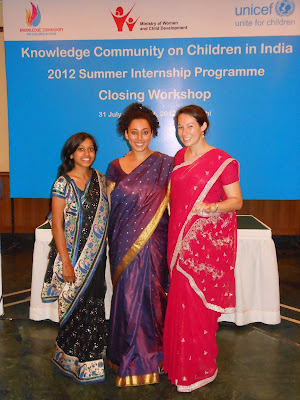Thursday, August 2, 2012
"Women and Other People" by Amartya Sen
Lecture by Professor Amartya Sen
Nobel Laureate in Economics (1998)
“Women and Other People”
31 July 2012 at India Habitat Centre, South Delhi, India
Following our internship programme’s closing workshop, the other interns and I were delighted to learn that the Population Foundation of India was hosting a lecture by Nobel Laureate Amartya Sen in a nearby auditorium. Because my team had presented our case report on ICDS in Assam earlier that morning, I attended the lecture in a traditional sari and was excited for this unexpected opportunity. Professor Sen prefaced his lecture with themes from his previous publications, including the idea that men and women have both congruent and conflicting interests in their pursuit of cooperation. He discussed gaps in female education in India as compared to neighboring Bangladesh, which spends 10% of its GDP on girls education. He explained that the small country has made remarkable progress in combating gender bias, and that there are even more girls than boys enrolled in school in recent years. He compared immunization rates of the two countries: 96% in Bangladesh versus 66% in India. It is not exactly a fair comparison to make as India has nearly ten times as many people as its northeast neighbor, however, lessons can be learned. It is also interesting that he brought up this comparison, considering the fact that Sen’s family originated from the part of India (East Bengal) now known as Bangladesh.
The Harvard professor and senior fellow went on to discuss the decreasing girl to boy sex ratio in India and implications of sex-selective abortion. He explained that states in the East and South are generally at or above the German benchmark of 94 girls to 100 boys, while states in the North and West have worse birth rates in that regard. He closed his lecture and opened the floor for questions with a simple, powerful statement: “We shall never get to the answers unless we start asking the right questions.”
Understandably, the questions directed at Professor Sen were intelligent and far-reaching. One Indian doctor asked for his thoughts on solving female foeticide, to which he frankly responded, “I don’t know.” This was followed by references to traditions in other cultures which have marginalized women but have seen great progress after a kind of tipping point forced the practice out of style. Examples include footbinding in China and FGM in Senegal, which reached 30-40% non-practice, then almost immediately increased to 70-80% non-practice and disapproval by the general population.


Posing with intern friends Subarna and Nadia from Bangalore (left) and our Assam team (right): Martin, Aditi, Thahira and me at the India Habitat Centre in New Delhi.
Nobel Laureate in Economics (1998)
“Women and Other People”
31 July 2012 at India Habitat Centre, South Delhi, India
Following our internship programme’s closing workshop, the other interns and I were delighted to learn that the Population Foundation of India was hosting a lecture by Nobel Laureate Amartya Sen in a nearby auditorium. Because my team had presented our case report on ICDS in Assam earlier that morning, I attended the lecture in a traditional sari and was excited for this unexpected opportunity. Professor Sen prefaced his lecture with themes from his previous publications, including the idea that men and women have both congruent and conflicting interests in their pursuit of cooperation. He discussed gaps in female education in India as compared to neighboring Bangladesh, which spends 10% of its GDP on girls education. He explained that the small country has made remarkable progress in combating gender bias, and that there are even more girls than boys enrolled in school in recent years. He compared immunization rates of the two countries: 96% in Bangladesh versus 66% in India. It is not exactly a fair comparison to make as India has nearly ten times as many people as its northeast neighbor, however, lessons can be learned. It is also interesting that he brought up this comparison, considering the fact that Sen’s family originated from the part of India (East Bengal) now known as Bangladesh.
The Harvard professor and senior fellow went on to discuss the decreasing girl to boy sex ratio in India and implications of sex-selective abortion. He explained that states in the East and South are generally at or above the German benchmark of 94 girls to 100 boys, while states in the North and West have worse birth rates in that regard. He closed his lecture and opened the floor for questions with a simple, powerful statement: “We shall never get to the answers unless we start asking the right questions.”
Understandably, the questions directed at Professor Sen were intelligent and far-reaching. One Indian doctor asked for his thoughts on solving female foeticide, to which he frankly responded, “I don’t know.” This was followed by references to traditions in other cultures which have marginalized women but have seen great progress after a kind of tipping point forced the practice out of style. Examples include footbinding in China and FGM in Senegal, which reached 30-40% non-practice, then almost immediately increased to 70-80% non-practice and disapproval by the general population.
Posing with intern friends Subarna and Nadia from Bangalore (left) and our Assam team (right): Martin, Aditi, Thahira and me at the India Habitat Centre in New Delhi.
Subscribe to:
Posts (Atom)